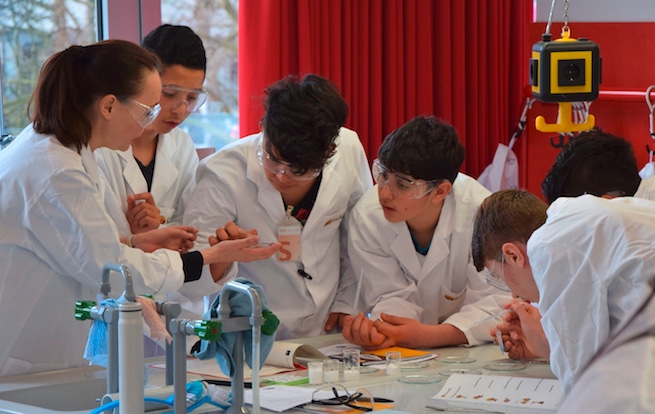Education is the key to integration, say German corporations
April 28, 2016

Having accepted over 1 million refugees in 2015 - and a half a million from Syria alone - Germany must now face up to the challenge of integrating them into German culture and society. To that end, new legal measures have been taken requiring migrants and refugees to follow language classes and lessons in German laws or cultural basics – or lose their residency rights.
Yet even before the new legislation took effect, some corporations had already scented a possible opportunity to address a problem that is increasingly seen a threat to the economic future of the country: the skills shortage. In November 2015, for example, German car manufacturers Daimler and BMW Group launched the first pilot programs to employ refugees in short-term training initiatives, including free German language classes.
And now Henkel has announced that it, too, is starting an extensive refugee’s integration program in its vocational training center. In collaboration with external partners and public authorities, the company is offering career guidance and job shadowing as well as internships, language courses and coaching for the refugees. The aim is to promote the integration of people with prospects of staying in Germany permanently.
 For this year, Henkel has provided the Fritz Henkel Foundation with an additional budget of 500.000 euros for refugee projects, on top of the ongoing product donations. “It is our joint responsibility to integrate the people who fled to us in both our society and economy,” said Kathrin Menges, Executive Vice President Human Resources at Henkel. “With our program we want to create a perspective for these people, because education and access to the labor market are key success factors for integration. This is where we need to start.”
For this year, Henkel has provided the Fritz Henkel Foundation with an additional budget of 500.000 euros for refugee projects, on top of the ongoing product donations. “It is our joint responsibility to integrate the people who fled to us in both our society and economy,” said Kathrin Menges, Executive Vice President Human Resources at Henkel. “With our program we want to create a perspective for these people, because education and access to the labor market are key success factors for integration. This is where we need to start.”
The integration program currently has 75 participants, mainly teenagers and young adults. It focuses on practical career guidance. The participants gain first insights into the work environment through vocational internships. In addition, they receive targeted coaching, language courses and job application training. The participants are chosen by collaborating external partners and public authorities. “We support young people by helping them search for apprenticeships and during the following application process,” says Dr. Loert de Riese-Meyer, Head of Vocational Training at Henkel Germany. “Most of them are not familiar with our education system and are not aware of the options they have.”
Language is a prerequisite for successful integration. Hence the Fritz Henkel Foundation has supported, among others, the Goethe Institute with a donation for language courses for refugees. These funds will enable more than 8,000 teaching units to be offered. Henkel continues to provide ‘unbureaucratic’ emergency aid, supplying the refugee camps with cleaning products, detergents, shampoos, shower gels or toothpaste. In addition, the company supports corporate volunteering of employees and retirees through product donations, financial support as well as paid time off work for up to eight days yearly.
About the Author(s)
You May Also Like


